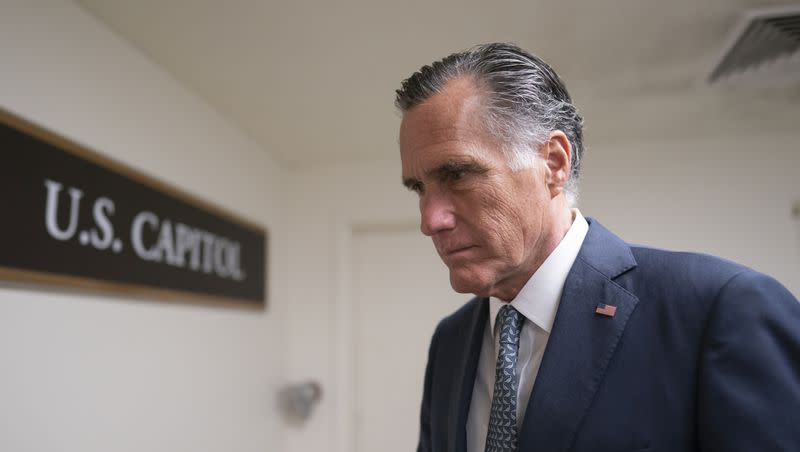Sen. Romney testifies at House Budget Committee hearing over his proposal to tackle $33 trillion in national debt

- Oops!Something went wrong.Please try again later.
- Oops!Something went wrong.Please try again later.
Sen. Mitt Romney insisted on solving the climbing U.S. national debt urgently and backed his proposal of creating a commission to tackle this problem in his testimony at the House Budget Committee hearing on Wednesday.
His latest legislation, the Fiscal Stability Act, which was cosponsored by Sen. Joe Manchin, D-W.Va., a close friend of Romney’s, would take on the national debt, which now exceeds $33.8 trillion, more than double the amount it was a decade ago.
The two senators crossed the Capitol to testify in front of their counterparts in the House, as they try to drum up support for their bill. The legislation needs bipartisan support, as Romney and Manchin try to find a solution to the nation’s growing national debt.
“We must reverse this catastrophic financial demise of our own making before it is too late,” Manchin said, testifying first. “We here in Congress have an obligation to get our finances in order so our children have the same shot at the American dream that we did.”
Since being proposed, the bill has earned bipartisan support from Sen. Kyrsten Sinema, I-Ariz., Sen. Todd Young, R-Ind., Sen. John Hickenlooper, D-Colo., Sen. Cynthia Lummis, R-Wyo., Sen. Mark Warner, D-Va., Sen. John Cornyn, R-Texas, Sen. Jeanne Shaheen, D-N.H., and Sen. Thom Tillis, R-N.C.
Related
Romney said the U.S. could have a debt problem like Italy and Greece
Speaking after Manchin, the Utah senator used charts and graphs to explain a potential fiscal reality six years from now where the federal government’s interest payments will exceed defense spending or domestic discretionary spending.
“So, unless we fix the fiscal calamity, we’re no longer going to be able to have military leadership in the world,” Romney said, adding that this path has negative effects on national security.
He also noted the nation’s mounting debt is putting the country “in the same hazardous category as Greece and Italy,” two countries that have high debt-to-gross domestic product ratios, a sign of poor fiscal health.
Romney pointed to another chart showing countries like Greece, Italy, Portugal, Ireland and Spain, successfully tackling their debt problems while the U.S. remains inactive on this front.
How would Romney and Manchin’s Fiscal Commission be set up?
Romney said the Fiscal Stability Act avoids some of the challenges associated with the National Commission on Fiscal Responsibility and Reform, created by President Barack Obama. It earned criticism for its recommendations of increasing the Social Security retirement age, reducing military, and domestic spending and hiking taxes.
Romney and Manchin’s proposal would create a bipartisan and bicameral commission made up of 15 members, of which 12 are elected officials and four are outside experts.
The commission would have the sole objective of stabilizing debt as a share of the GDP, or gross domestic product, with all spending “on the table” for consideration. If the commission achieves a bipartisan consensus, then the House and Senate would follow a privileged floor process, Romney said.
Related
He concluded his opening statement by saying, “This is a decision we have, we’re either going to be known as a generation that took on tough challenges and solved them, or one that didn’t. We all lived in the shadow of the greatest generation.”
Romney mentioned former President Bill Clinton’s bipartisan efforts to increase tax revenue while making cuts to spending — which “got us on track and actually got a balanced budget.”
“This is something we can do, but only if we do it on a bipartisan basis,” the Utah senator said.
Could a Fiscal Commission cut Social Security?
Rep. Brendan Boyle, D-Pa., ranking member of the House Budget Committee, pushed back on the possibility of spending cuts on Social Security and Medicare.
He cited a poll by Navigator Research from late June, which found that 4 in 5 Americans support raising taxes on wealthy corporations and individuals, which includes closing tax loopholes. Meanwhile, only 7% of voters said they support cuts to Social Security and Medicare, said Boyle.
Romney responded by saying he didn’t know a single lawmaker, Democrat or Republican, who supported slashing these benefits. Even President Joe Biden and former President Donald Trump, the leading contenders for the presidential election in 2024, are on the same page, as are Romney and Manchin.
The Utah senator said he guessed the commission would also agree not to touch entitlements for current or near retirees.
“The question is, well, how about for people in their 20s and 30s? What should it look like at that point?” Romney said, noting the change in life expectancy for future generations could warrant a conversation about an adjustment in tax rates.
“One thing that’s not on the table is the idea that we’re going to cut benefits,” he added. “That would simply be unacceptable.”
Related

